You may also try this query (once more solutions beside those given by PM 77-1 in the comment above) :
WITH RECURSIVE cte( id, date_start, date_end ) AS
(
SELECT id, date_start, date_end
FROM evento
UNION
SELECT e.id,
least( c.date_start, e.date_start ),
greatest( c.date_end, e.date_end )
FROM cte c
JOIN evento e
ON e.date_start between c.date_start and c.date_end
OR
e.date_end between c.date_start and c.date_end
)
SELECT distinct date_start, date_end
FROM (
SELECT id,
min( date_start) date_start,
max( date_end ) date_end
FROM cte
GROUP BY id
) xx
ORDER BY date_start;
Demo ---> http://www.sqlfiddle.com/#!12/bdf7e/9
however for huge table the performance of this query could be horribly slow, and some procedural approach might perform better.

